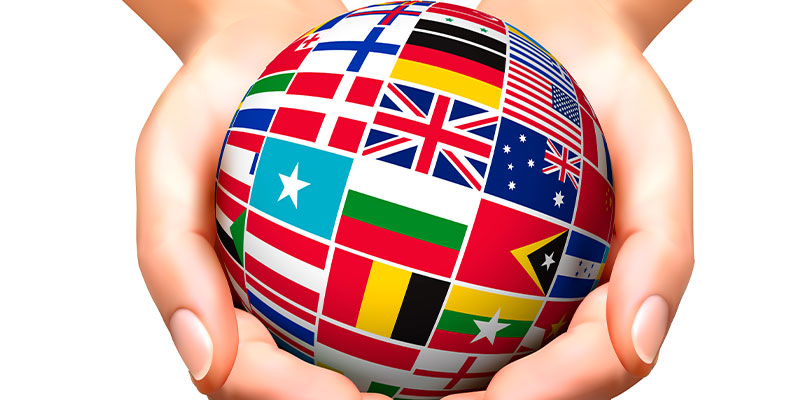In a world where information can be participated in all languages, a trip to any part of the world has come fluently accessible, and learning an alternative or indeed third language opens new job openings, bilingualism and multilingualism are getting decreasingly important. So, it’s possible to tell that someone who is bilingual is also multilingual. Basically, bilingualism falls under the wide conception of multilingualism.
At this point, the question of “What are the benefits of being bilingual or multilingual?” naturally arises. We can list these benefits simply as having a sharper mind, stronger and diverse career opportunities, the opportunity to experience different cultures in a globalized world, and healthier well-being through an active mind. The impact of bilingualism and multilingualism on mental health is significant, as learning a new language can help keep an aging brain active. Recent studies support this notion and demonstrate the constructive impact of bilingualism on the human brain. Thus, it can be said that bilingualism is important not only for cross-cultural commerce and new job openings but also for its positive goods on cognitive capacities.
In summary, by learning a new language, we can enhance our focus, concentration skills, gain the opportunity to explore different cultures, develop different perspectives, and even stay mentally active. Still, the capability to express oneself in different languages is a process that takes time. Taking a 6-month foreign language course is not sufficient for someone to become bilingual and multilingual.
The Power of Speaking Multiple Languages
Are we truly apprehensive of the power of multilingualism, which can be one of our topmost strengths? While people may desire to learn a second or even third language for specific purposes in their lives, multilingualism offers numerous powers that enrich various aspects of our lives. From cognitive development to professional life, educational skills to cultural awareness, multilingualism is a driving force that enables our growth in many areas.
From a cognitive perspective, multilingualism enhances our creativity and detainments the onset of age-related cognitive decline. It also contributes to our problem-working capacities. Developing better focus is another power that bilingualism and multilingualism grant us. Processing different languages, switching between them, and thinking in multiple languages keeps both hemispheres of the brain active. The region responsible for executive function, which includes focus, remains engaged due to the constant suppression of inactive language. This mechanism becomes a dynamic force that exercises our executive functions.
Similarly, multilingualism empowers us with the ability to multitask. Multilingual individuals can transition between tasks much faster and more efficiently, just as they switch between languages. As a result, they can perform multiple tasks contemporaneously with lesser ease and smoothness. For instance, learning a third language becomes easier for multilingual individuals compared to those who do not have any foreign language skills. Having accustomed their brains to expressing themselves in different languages, multilingual individuals find it easier to acquire a third language.
In addition to these cognitive benefits, multilingualism offers multitudinous other advantages in terms of profitable, socio-artistic, and educational aspects. It enhances tone-confidence, improves problem-working chops, increases intercultural mindfulness, facilitates academic success, and detainments age-related cognitive decline. Being multilingual is a significant advantage and power that allows us to develop ourselves, maintain good health, and benefit from its advantages in our daily lives. Neglecting such a powerful tool would mean turning our back on a known source of strength. Why would anyone not want a commodity that makes them stronger in every aspect of life? Use this power.
Bilingualism vs. Multilingualism: Understanding the Differences
Education, migration, multicultural societies, language policies, social exclusion, or inclusion are some of the areas where the concepts of bilingualism and multilingualism, even the emerging concept of plurilingualism are increasingly used. But what’s the difference between plurilingualism, bilingualism, and multilingualism? Are they fully different from each other? Although these three terms are frequently used interchangeably, the main distinction lies not so important in their precise delineations, but in the associations, they elicit in people.
Bilingualism refers to the knowledge and use of two languages. But it’s constantly used to encompass the knowledge of further than two languages. It’s generally used in comparison with monolingualism, pertaining to individuals who speak only one language. Therefore, when making a comparison between individuals who speak only one language and those who speak further than one, the terms bilingualism and monolingualism are used. There isn’t a clear distinction between individuals who speak two languages and those who speak further than two.
Bilingualism and multilingualism are generalities studied from different perspectives in fields like linguistics, sociology, and pedagogy. Some researchers use bilingualism and multilingualism terms interchangeably, while others highlight different aspects and use them in different contexts. For example, from a verbal viewpoint, bilingualism and multilingualism are looked like different conceptions. Because bilingualism and multilingualism are developed under different conditions, in different surroundings, and in different ways.
According to a study conducted in Japan, multilingual individuals have similar brain activation to that of bilingual individuals, but the activation is much more sensitive and faster. In simple terms, the conception of bilingualism refers to the capability to speak and understand two languages, while multilingualism refers to an existence using further than two languages.
Another depth of meaning in the concept of multilingualism is the perception that it implies the simultaneous acquisition of both languages from birth. It is often assumed that a multilingual individual speaks both languages perfectly, like a native speaker. While such cases exist, it is not entirely accurate to assume this for all multilingual individuals. Like bilingual individuals, multilingual individuals may have acquired their additional languages at different stages of life.
How They Shape Our World?
Not long agone, and for important of the 20th century, being bilingual was seen as mischievous to an existence’s particular development. Many people believed that there was only room for one language in a child’s brain. Speaking a second language was thought to hinder social integration and academic success. However, speaking two or even three languages is far from being harmful to individuals; on the contrary, bilingualism and multilingualism can lead to numerous positive changes in society. Above all, it enhances the ability to see situations from different perspectives and fosters tolerance towards others.
Since the mid-20th century, numerous benefits of bilingualism and multilingualism have been revealed. For example, being multilingual gives a child mental flexibility, superiority in concept formation, and a wider range of mental abilities. Multilingual individuals are more competent in problem-solving and critical thinking. Research in neuroscience shows that multilingual speakers have enhanced cognitive chops in areas of the brain responsible for memory, attention, and multitasking.
When you learn an alternate language, you gain an indispensable view of the world. It’s like listening to music in stereo instead of from a single speaker or headphones. Multilingual individuals are more open to accepting different perspectives and can transition between them more easily. These diverse perspectives also contribute to shaping the language of culture.
In the age of borderless global communication, being limited to a single language is considered outdated. Languages help us make sense of the world and greatly influence our way of understanding and describing it. Open-mindedness and cultural sensitivity are skills acquired through multilingualism. They are highly valuable in today’s globalized world, enabling multilingual individuals to engage more easily with people from different linguistic backgrounds. Bilingualism and multilingualism allow for continuous assessment of social situations, making individuals better able to cope with changes in their lives and surroundings.
In conclusion, being multilingual is an occasion to see the world through different eyes, gain a different perspective, and be more culturally competent. It may be the key to adapting to a changing and evolving world, and even taking a leading role in these dynamics.

The Cognitive Advantages of Bilingualism and Multilingualism
In multilingual individuals, brain functions such as perception, memory, and cognitive control develop. Multilingual or bilingual individuals have a lower likelihood of attentional distractions. Additionally, they possess executive function skills of the brain, including multitasking, ignoring irrelevant information, focusing, and gaining mental flexibility and different perspectives.
Furthermore, multilingualism helps delay the decline in cognitive abilities associated with aging and can delay the onset of cognitive diseases. In other words, increased brain exertion through language switching or learning a new language can decelerate the aging process or reduce the threat of serious conditions like Alzheimer’s. Research has shown that Alzheimer’s complaint progresses more sluggishly and has a lower impact on bilingual individuals compared to those who speak only one language.
Bilingualism and Multilingualism in the Global Workplace
In the business world, bilingualism and multilingualism are considered crucial skills in the globalized economy. Thus, the demand for bilingual or multilingual workers in both the private and public sectors is adding day by day. Multilingual employees who overcome cultural barriers and language obstacles serve as a bridge in the international business arena. They facilitate communication among stakeholders and provide valuable insights into local markets and cultures. When we look at countries in a public position, those with a high viscosity of multilingual population have a more positive global image in terms of transnational trade and artistic exchanges.
The capability of people from different countries to communicate in different languages helps overcome language walls and facilitates communication. Multilingualism also facilitates cultural exchange between countries. Furthermore, people’s ability to communicate in multiple languages leads to new trade opportunities between countries. In general, multilingualism paves the way for greater collaboration by facilitating communication, enhancing cultural exchange, and increasing trade opportunities.
In summary, being multilingual enables individuals to develop their careers and opens new doors in the business world. Being multilingual is a significant advantage in the business world and can greatly improve job prospects. Especially at this stage, jobs can be found in service areas such as multilingual SEO service.



